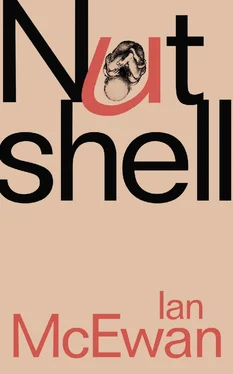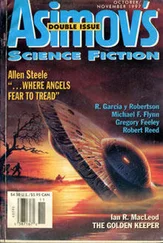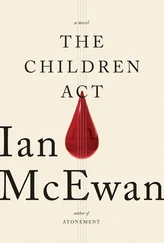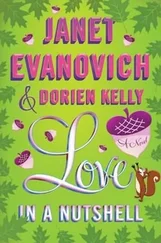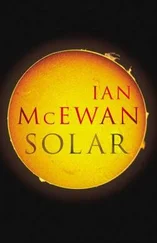‘My back,’ she growls. ‘My fucking back.’
But it’s worth her pain, for she’s steadied herself and takes the remaining steps with care. Claude, busy by the kitchen sink, pauses to make a sympathetic sound, then continues with his tasks. Time waits for no man, as he might say.
She’s at his side. ‘My head,’ she whispers.
‘And mine.’ Then he shows her. ‘I think it’s his favourite. Bananas, pineapple, apple, mint, wheat germ.’
‘Tropical Dawn?’
‘Yup. And here’s the business. Enough to fell ten ox.’
‘Oxen.’
He pours the two liquids into the blender and activates it.
When the din has ceased she says, ‘Put it in the fridge. I’ll make the coffee. Hide those paper cups. Don’t touch them without your gloves.’
We’re at the coffee machine. She’s found the filters, she’s spooning in the grains, tipping in the water. Doing well.
‘Wash some mugs,’ she calls. ‘And set them out. Get the stuff ready for the car. John’s gloves are in the outhouse. They’ll need dusting down. And there’s a plastic bag somewhere.’
‘All right, all right.’ Out of bed long before her, Claude sounds testy as she takes control. I struggle to follow their exchange.
‘My thing and the bank statement are on the table.’
‘I know.’
‘Don’t forget the receipt.’
‘I won’t.
‘Screw it up a bit.’
‘I have.’
‘With your gloves. Not his.’
‘Yes!’
‘You wore the hat in Judd Street?’
‘Of course.’
‘Put it where he’ll see it.’
‘I have .’
But he’s at the sink, rinsing crusty cups, doing as he’s told. She’s impervious to his tone and adds, ‘We should tidy this place up.’
He grunts. A hopeless notion. Good wife Trudy wants to greet her husband with a tidy kitchen.
But surely none of this can work. Elodie knows that my father is expected here. Perhaps half a dozen friends know too. London, north to east, will point a finger across the corpse. Here’s a pretty folie à deux . Could my mother, who’s never had a job, launch herself as a murderer? A tough profession, not only in the planning and execution, but in the aftermath, when the career would properly begin. Consider, I want to say to her, even before the ethics, the inconvenience: imprisonment or guilt or both, extended hours, weekends too, and all through every night, for life. No pay, no perks, no pension but remorse. She’s making a mistake.
But the lovers are locked in, as only lovers can be. Being busy about the kitchen keeps them steady. They clear from the table last night’s debris, sweep up or sweep aside food scraps on the floor, then down more painkillers with a slug of coffee. That’s all the breakfast I’m getting. They agree that around the kitchen sink there’s nothing to be done. My mother mutters instructions, or guidelines. Claude remains terse. Each time, he cuts her off. He may be having second thoughts.
‘Cheerful, OK? Like we thought through what he said last night and decided—’
‘Right.’
After minutes of silence: ‘Don’t go offering too soon. We need—’
‘I won’t.’
And again: ‘Two empty glasses to show that we’ve had some ourselves already. And the Smoothie Heaven cup—’
‘It’s done. They’re behind you.’
On his final word we’re startled by my father’s voice from the top of the kitchen stairs. Of course, he has his key. He’s in the house.
He calls down. ‘Just unloading the car. Then I’ll be with you.’
His tone is gruff, competent. Unearthly love has made him worldly.
Claude whispers, ‘What if he locks it?’
I’m close to my mother’s heart and know its rhythms and sudden turns. And now! It accelerates at her husband’s voice, and there’s an added sound, a disturbance in the chambers, like the distant rattling of maracas, or gravel shuffled softly in a tin. From down here I’d say it’s a semilunar valve whose cusps are snapping shut too hard and sticking. Or it could be her teeth.
But to the world my mother appears serene. She remains the liege and mistress of her voice, which is even and doesn’t stoop to whispers.
‘He’s a poet. He never locks the car. When I give you the sign, go out there with the stuff.’
DEAR FATHER,
Before you die, I’d like a word. We haven’t much time. Far less than you think, so forgive me for coming to the point. I need to tap your memory. There was a morning in your library, a Sunday of unusual summer rain when the air for once was clean of dust. The windows were open, we heard the pattering on the leaves. You and my mother almost resembled a happy couple. There was a poem you recited then, too good for one of yours, I think you’d be the first to concede. Short, dense, bitter to the point of resignation, difficult to understand. The sort that hits you, hurts you, before you’ve followed exactly what was said. It addressed a careless, indifferent reader, a lost lover, a real person, I should think. In fourteen lines it talked of hopeless attachment, wretched preoccupation, longing unresolved and unacknowledged. It summoned a rival, mighty in talent or social rank or both, and it bowed in self-effacement. Eventually, time would have its revenge, but no one would care or even remember, unless they chanced to read these lines.
The person the poem addressed I think of as the world I’m about to meet. Already, I love it too hard. I don’t know what it will make of me, whether it will care for me or even notice me. From here it seems unkind, careless of life, of lives. The news is brutal, unreal, a nightmare we can’t wake from. I listen with my mother, rapt and glum. Enslaved teenage girls, prayed over then raped. Barrels used as bombs over cities, children used as bombs in marketplaces. We heard from Austria about a locked roadside truck and seventy-one migrants left to panic, suffocate and rot. Only the brave would send their imaginations inside the final moments. These are new times. Perhaps they’re ancient. But also, that poem makes me think of you and your speech last night and how you won’t or can’t return my love. From where I am, you and my mother and the world are all one. Hyperbole, I know. The world is also full of wonders, which is why I’m foolishly in love with it. And I love and admire you both. What I’m saying is, I’m fearful of rejection.
So say it again to me, this poem, with your dying breath and I’ll say it back to you. Let it be the last thing you ever hear. Then you’ll know what I mean. Or take the kinder course, live rather than die, accept your son, hold me in your arms, claim me for your own. In return I’ll give you some advice. Don’t come down the stairs. Call out a carefree goodbye, get in your car and go. Or if you must come down, decline the fruit drink, stay only long enough to say your farewells. I’ll explain later. Until then, I remain your obedient son …
We’re sitting at the kitchen table, attending in silence to the intermittent thumps of my father’s footfalls above as he brings in boxes of books and leaves them in the sitting room. Murderers before the deed find small talk a burden. Dry mouth, thready pulse, whirling thoughts. Even Claude is stumped. He and Trudy drink more black coffee. At each mouthful they put their cups down without a sound. They’re not using saucers. There’s a clock I haven’t noticed before, ticking in thoughtful iambs. Along the street, a delivery van’s pop music approaches and recedes with a faint Doppler effect, the cheerless band lifting and dipping a microtone but staying in tune with itself. There’s a message in there for me, just out of reach. The painkillers are coming on, but the gain is mere clarity where numbness would suit me better. They’ve been through it twice and everything is in order. The cups, the potion, the ‘thing’, something from the bank, the hat and gloves and receipt, the plastic bag. I’m baffled. I should have listened last night. I won’t know if the plan is going well or about to unravel.
Читать дальше
